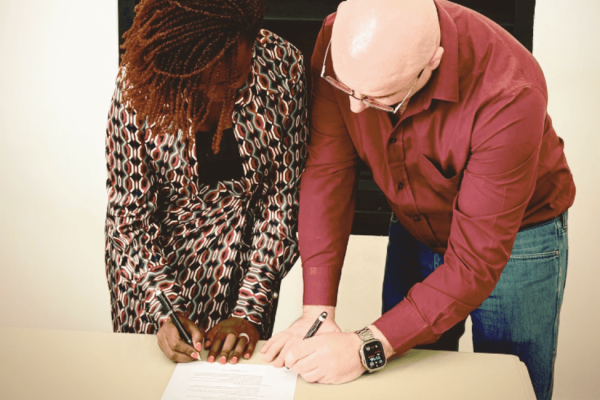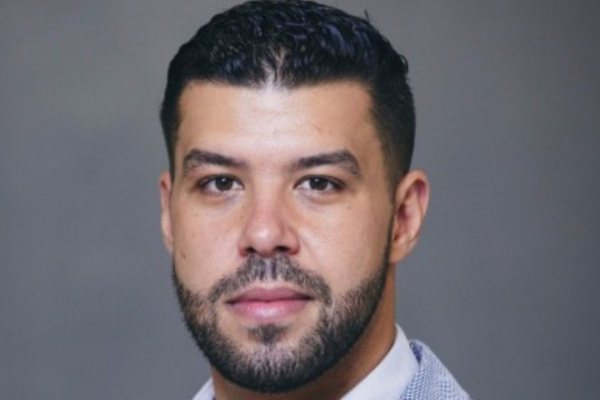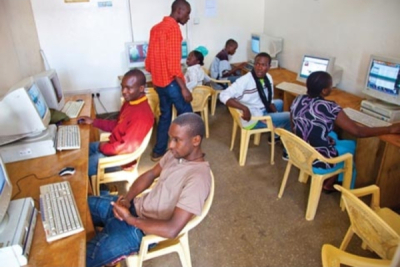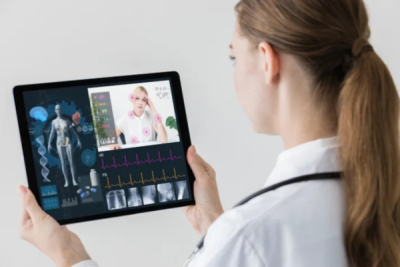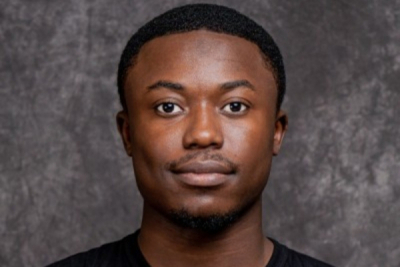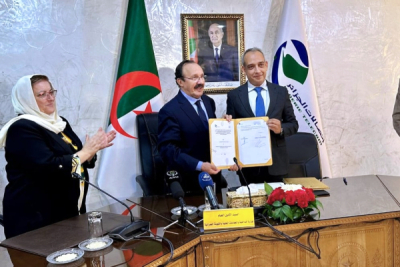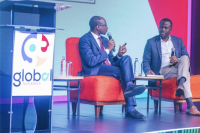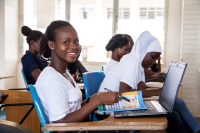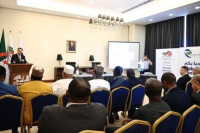Glass House PR has partnered with the Fintech Association of South Africa (FINASA) to host the 3rd Africa Digital Finance Summit (ADFS) in Johannesburg.
The summit will discuss regulatory advancements, technological innovations, and fintech investment opportunities. It will take place from November 20th to 22nd.
With over 17 years of experience in communication and team management, particularly in sales, he currently leads WenaData. His role involves assisting businesses by providing them with valuable information and statistical data.
Nuno Soares is a Mozambican entrepreneur with a degree in Information Sciences from the Instituto Superior Miguel Torga in Portugal. He is the co-founder and CEO of WenaData, a technology company offering solutions and services to citizens and organizations.
Founded in 2017, WenaData provides a web platform, software, a mobile application, and research tools. It collects statistical data for the government, the private sector, and other institutions, serving as an educational barometer and aiding in information gathering and strategic decision-making.
Discussing the origins of his company, Nuno Soares explains, "The idea came from a group of people with common projects. We wanted to create a company in a field that was not sufficiently explored in our country, with a different market approach that truly makes a difference. It took us about a year to develop the entire project. A trial version was released in July 2017, and the final version was published on December 18."
In addition to WenaData, Nuno Soares is the co-founder and CEO of Veludo & Mentol, an advertising and new technology company founded in 2014. Since January 2018, he has been the director of Revista Xonguila, a monthly magazine available online and in print that highlights Mozambique's tourism, culture, entrepreneurship, and environment.
Before venturing into entrepreneurship, Nuno Soares gained experience working for several companies. In 2003, he was hired by NOS Lusomundo Audiovisuais, an audiovisual company, as a cinema technician. In 2006, he joined Guimasete, a Portuguese telecommunications company, where he worked as a customer service specialist until 2015.
Melchior Koba
Affordable internet access is one of the top priorities of the United Nations' Sustainable Development Goals (SDGs). Despite efforts by organizations and governments across Africa, the high cost of internet remains a significant barrier to widespread use.
Africa remains the continent with the highest fixed internet costs in the world, according to the International Telecommunication Union (ITU). On the continent, users pay five times more than the global average for 5 gigabits (5 GB) of data. Globally, the price of broadband internet services averages 2.9% of monthly gross national income (GNI) per capita, while in Africa, it stands at a staggering 14.8%. The Broadband Commission, a specialized ITU body, considers internet costs affordable if they are equal to or below 2% of GNI.
In its June 2024 report, "The State of Broadband 2024: Leveraging AI for Universal Connectivity," the Broadband Commission attributes Africa's high internet costs to low purchasing power. "The lack of financial means remains a major barrier to internet access, especially in low-income economies. A significant gap persists between high-income economies and the rest of the world," the report states.
Beyond the issue of low purchasing power, the high cost of internet in Africa is also due to insufficient telecom infrastructure, which forces some markets to charge high prices to recoup investments. "Fixed broadband networks are very expensive to deploy, maintain, and upgrade, depending on the geography and extent of the territory to be covered," the ITU explains.
The Broadband Commission's October 2019 report, "Connecting Africa Through Broadband: A strategy for doubling connectivity by 2021 and reaching universal access by 2030," estimated that approximately $100 billion is needed to fully cover the continent with internet by 2030. Africa's reliance on foreign cables, with high international transit costs, remains a challenge for accessible fixed broadband on the continent.
This situation negatively impacts small and medium-sized enterprises (SMEs) in Africa, as the internet is essential in the digital transformation era. According to a survey by the International Finance Corporation and the World Bank, internet use for business purposes among 3,325 microenterprises in seven African countries averaged 7%, ranging from 24% in South Africa to 1% in Rwanda.
The Broadband Commission's primary goal is to make broadband affordable in developing countries by 2025. While achieving this goal in Africa next year remains uncertain, the commission notes that "ICT services tracked by the ITU have become more affordable in 2023 than ever before."
In 2022, the cost of fixed internet in Africa was 16.3% of monthly GNI per capita, down from 18.3% in 2021 and nearly 483% in 2009. Despite these improvements, much work remains to make internet access truly affordable and widespread across the continent.
Adoni Conrad Quenum
E-health solutions are rapidly expanding across African nations, establishing themselves as preferred alternatives and significantly improving access to healthcare for populations.
eSiha is an e-health solution developed by an Algerian startup, enabling users to access various healthcare services through its mobile application. Founded in 2019 by Hachi Bilal, the Algiers-based startup offers a comprehensive platform available on both iOS and Android, with over 50,000 downloads reported on the Play Store.
Users can create an account with their personal information after downloading the app. Healthcare professionals can identify themselves by checking a box at the end of the registration form.
eSiha connects users with a wide range of healthcare professionals, including doctors, specialists, paramedics, pharmacists, and radiologists. The platform features a search bar where users can input the type of healthcare professional they need and the region (wilaya) for the search. Within a few clicks, users receive a list of healthcare professionals to address their medical needs.
Beyond geolocating healthcare professionals, eSiha simplifies online appointment scheduling, audiovisual teleconsultations, and the creation of digital health records. The latter service is particularly useful for tracking patients with chronic illnesses. Healthcare professionals can manage their schedules conveniently through their dashboard.
Alert systems via messages and emails remind patients and professionals about upcoming appointments. Since its launch, the healthtech startup boasts 10,850 practitioners, approximately 77,000 users, and nearly 4,000 daily connections on its platform.
eSiha is making significant strides in improving healthcare access and efficiency in Algeria, demonstrating the impactful role of digital solutions in modern healthcare.
Adoni Conrad Quenum
A serial entrepreneur, he has co-founded several companies in the technology, e-commerce, and digital marketing sectors. His latest innovation assists merchants in optimizing their sales on social media and managing their business operations more efficiently.
Ali Ouattara (photo) is an Ivorian marketing expert and serial entrepreneur. He is the co-founder and CEO of Tuzzo, an all-in-one digital solution designed for both informal and formal sector vendors in Africa.
Founded in 2023, Tuzzo helps merchants boost their revenue by selling products on social media platforms such as Facebook, WhatsApp, Instagram, and TikTok. The app centralizes all sales channels and enables the launch of targeted promotional campaigns to retain customers and drive sales. Tuzzo users also have access to essential data such as profits, total sales, expenses, top-selling products, and best customers.
In addition to Tuzzo, Ali Ouattara is the founder and board member of bim!, a startup offering a digital business card linked to a mobile app for instant information sharing. He also founded Diago, an e-commerce startup launched in 2021 and sold in May 2022 to Chari, a Moroccan company providing e-commerce and fintech solutions to merchants. Currently, he serves as the managing director of Chari in Côte d'Ivoire.
Ali Ouattara's first venture, Digit Communication, was launched in 2017. This 360° marketing agency supports small and medium-sized enterprises in developing and implementing their communication strategies. Ali was a board member of Digit Communication until 2020.
The serial entrepreneur holds a bachelor's degree in marketing, communication, and distribution obtained in 2018 from the Félix Houphouët-Boigny National Polytechnic Institute in Yamoussoukro. He also graduated from the Ecole supérieure de commerce d'Abidjan, where he earned a master's degree in marketing in 2021.
To gain extensive experience, Mr. Ouattara worked for several startups. In 2020, he became the brand manager for PepsiCo in Côte d'Ivoire. From 2021 to 2022, he was a partner at Glovo, an on-demand service app for local restaurants, grocery stores, supermarkets, and retail shops.
Melchior Koba
Digital transformation is advancing rapidly across Africa. To fully embrace this progress, the continent needs to address two key areas: improve internet coverage and equip the population with digital skills.
The Algerian Ministry of Interior, Local Authorities, and Territory Planning has signed a partnership agreement with the public company Algérie Télécom. Unveiled on Thursday, July 4, this collaboration aims to connect all primary schools in Algeria.
Specifically, the incumbent operator will provide the targeted schools with high-speed internet connectivity and fixed-line telephone services. Priority will be given to schools located in low-income municipalities.
This initiative aligns with the Algerian government's efforts to develop an "information society" through infrastructure, telecommunications resources, and the widespread use of ICT in all economic sectors. In May, President Abdelmadjid Tebboune instructed the implementation of measures to improve the quality and coverage of internet services across the country.
The partnership is expected to create "a more efficient educational environment nationwide." It will enable Algerian primary school students and teachers to access online educational resources, conduct research, learn, and communicate more effectively. It will also help introduce school children to digital skills at an early age.
Isaac K. Kassouwi
Tackling healthcare disparities intensified by conflict and displacement is crucial for building long-term resilience and self-sufficiency among refugees. Utilizing advanced technology allows for the provision of immediate medical aid, enhancing healthcare accessibility a vital element in the broader framework of African development and stability.
U.S. messaging platform Gupshup, Meta (formerly Facebook), the Sudan Medical Specialization Board, and Shabaka, a consulting and research organization dedicated to humanitarian issues, have jointly launched a telemedicine chatbot. The initiative, announced by Gupshup on July 3, aims to deliver medical assistance to Sudanese refugees.
“We are honored to be part of this humanitarian project that aims to provide essential healthcare services to Sudanese refugees in need. By leveraging the power of conversational AI and the reach of WhatsApp, we can make a significant impact on the lives of these individuals who have faced immense challenges,” said Beerud Sheth, Founder & CEO of Gupshup.
The chatbot, accessible via WhatsApp, targets refugees in Egypt, Eritrea, Saudi Arabia, Libya, Djibouti, and other neighboring countries. The telemedicine service offers a secure, regulatory-compliant platform supporting Arabic and English, with additional languages planned.
According to Gupshup, the project aims to meet the urgent healthcare needs of about 800,000 Sudanese refugees with limited access to medical services. The chatbot allows patients to connect with healthcare providers, who then route them to a triage team for assessment before linking them to one of over 18 specialty doctors.
The United Nations High Commissioner for Refugees (UNHCR) reveals that the ongoing conflict has left nearly 25 million people in Sudan in need of humanitarian assistance, with severe shortages of food, water, medicine, and fuel affecting millions. This underscores the importance of scalable, tech-driven solutions in humanitarian aid efforts to support vulnerable populations in crises effectively.
Hikmatu Bilali
The Global Tech Africa (GTA) Conference 2024 invites innovators and stakeholders to leverage AI to transform Africa’s tech landscape.
The event is scheduled for July 24-26 in Lagos, Nigeria. It aims to facilitate partnerships, investments, and capacity building.
The Mastercard Foundation, in partnership with the Federal Government of Nigeria, will host its first EdTech Conference from July 8 to 10, 2024, at Abuja's Hilton Transcorp.
Themed ‘Education Technology for Resilient and Inclusive Learning in Africa,’ the event aligns with the African Union’s Year of Education and focuses on EdTech trends, policies for fostering innovation, and its role in solving educational challenges across Africa.
Over the past two years, Algeria has doubled its international bandwidth capacity. In 2020, Algeria's international bandwidth was 1.5 Tbps (terabits per second). This has increased to 7.8 Tbps in 2022 and reached 9.8 Tbps in early 2024.
Algeria has made significant progress in strengthening its digital infrastructure by completing a 2,600 km segment of fiber optics, a key component of the Trans-Saharan Fiber Optic Backbone project (DTS). Abdelouahab Bara, the Secretary-General of the Ministry of Post and Telecommunications, announced this achievement on Sunday, July 7, in Algiers during the opening of the 5th session of the project's Liaison Committee.
According to Bara, the project aims to "create a technological dynamic that fosters the emergence of a digital economy in the concerned countries, contributing to the development of e-commerce on the continent and online financial services, as well as improving the business climate."
This initiative is part of the African Union's New Partnership for Africa's Development (NEPAD), aimed at continental integration and the development of the digital economy in the region. It connects six countries: Algeria, Niger, Nigeria, Chad, Mali, and Mauritania. The 79 million euro project is co-funded by the African Development Bank (AfDB) and the European Union (29 million euros) following a delegation agreement administered by the AfDB.
Algeria's connection to this trans-Saharan backbone aims to strengthen and diversify the national economy by increasing high-speed broadband connectivity. According to DataReportal, Algeria had 50.65 million active mobile cellular connections at the beginning of 2024, with a penetration rate of 110.2% of the population.
Once completed, the project will enhance regional connectivity with neighboring countries and support a range of electronic services. The agricultural, educational, health, and commercial sectors will benefit from this project, creating new opportunities, particularly new jobs, and improving incomes, especially in rural areas.
Samira Njoya
More...
Satellite technology is crucial for developing societies, impacting agriculture, navigation, banking, and mining by enhancing resource management, productivity, and sustainability. It supports sustainable development goals and aligns with global efforts to combat climate change and promote conservation.
EnduroSat, a Bulgarian aerospace company, announced on July 3 plans to partner with the Botswana International University of Science and Technology (BIUST) to build Botswana's first software-defined satellite, BOTSAT-1. The satellite, set to launch on SpaceX’s Transporter-13 mission by February 2025, will aid the country's mining and agricultural sectors.
“EnduroSat has been an exceptional partner in our journey to launch Botswana's first satellite. Their expertise and support have been invaluable, and we are excited about the progress we have made together. This partnership brings us closer to realizing our shared vision and underscores the strength of our mutual commitment to advancing space technology in Botswana,’’ said BIUST Vice Chancellor Professor Otlogetswe Totolo
BIUST engineers will collaborate with EnduroSat for the satellite's assembly and payload integration. BOTSAT-1 will feature a hyperspectral sensory camera with a spatial resolution of 32 meters at an altitude of 500 kilometers. SpaceX will oversee launch logistics and conduct rigorous testing to ensure a smooth process.
The satellite will provide critical data for resource management and sustainable development, aiding Botswana in addressing developmental challenges. It will enhance agricultural productivity and sustainability by tackling low productivity, water scarcity, and soil quality. High-quality images will help geologists identify potential mineral deposits and map access routes, providing essential information on land cover, including roads, tracks, and fences.
In 2023, Botswana was ranked 85th on the Global Innovation Index (GII), which captures the innovation ecosystem performance of 132 economies and tracks the most recent global innovation trends. The BOTSAT-1 project is expected to boost Botswana's position by enhancing its technological capabilities and fostering innovation in key sectors.
Hikmatu Bilali
Concerned about the security of data collected by companies, he develops innovative tools to ensure the protection of data collected by digital businesses in emerging markets.
Lanre Ogungbe (photo) is a Nigerian computer scientist and entrepreneur. He is a co-founder and the CEO of Prembly, a data infrastructure and compliance provider for businesses.
Founded in 2021, Prembly specializes in identity verification, security, and compliance, with the mission of protecting digital businesses in emerging markets. This allows these companies to operate globally by establishing a trustworthy relationship with their clients. Under its brand, Prembly offers several solutions, including IdentityPass, IdentityRadar, IdentityForm, Compliance Tracker, and Background Checks by Prembly.
IdentityPass helps digital businesses acquire and onboard clients through instant data verification tools, document verification, and biometric authentication. IdentityForm ensures the authenticity and accuracy of user information. IdentityRadar provides a comprehensive suite of fraud prevention tools, facilitating identity verification and fraud detection for businesses worldwide.
On Wednesday, July 3, Prembly announced its merger with Peleza, a Kenyan company specializing in background and identity checks. The new entity, Prembly Group, will be led by Lanre Ogungbe and will bring together over 100 employees across offices in Uganda, Kenya, the United States, and Nigeria.
Lanre Ogungbe is a member of the Forbes Business Council and serves on the board of The IREDE Foundation, a nonprofit organization dedicated to encouraging, educating, and empowering children aged 0 to 18 living with congenital disabilities. He graduated from Adekunle Ajasin University with a bachelor's degree in computer science and earned a master's degree in analysis, leadership, and innovation from The Johns Hopkins University in 2023.
His professional career began in 2014 as a team leader at Enactus. In 2017, he became the operations director at myPadi.ng, a Nigerian digital platform facilitating housing access. From 2018 to 2021, he served as head of business and customer services at Accounteer, an online accounting company for entrepreneurs.
Melchior Koba
For several years, he worked as a web designer for various companies. Today, as an entrepreneur, he operates a startup that specializes in the online sale and delivery of fresh household and food products.
Muhammad S. Habib (photo) is an Egyptian computer scientist and entrepreneur who co-founded Breadfast, a startup specializing in the delivery of food and household products. Founded in 2017, Breadfast aims to revolutionize product delivery in Egypt by offering dairy products, eggs, fresh bread, fruits, and vegetables, all available 24/7, with products packaged and delivered fresh daily.
The startup delivers to most neighborhoods in Cairo and Giza, as well as to Alexandria for same-day food deliveries. It also serves Riyadh, Saudi Arabia, for next-morning bakery deliveries.
Before Breadfast, Muhammad S. Habib co-founded Nafham in 2012, an online educational video platform aligned with the public school curriculum. In 2015, he also co-founded MarginUX, a Cairo-based user experience design and consulting firm.
Muhammad S. Habib holds a bachelor's degree in computer science from the Modern Academy in Maadi, Egypt, obtained in 2009. He also earned a master's degree in management and business administration from ESLSCA Business School Paris in 2014. His professional career began in 2009 at LINKonLINE, an online services and content provider, where he worked as a web designer. From 2010 to 2011, he held the same position at MSN Middle East.
In 2011, he became a UI designer at Samardy, a company under the telecom operator Vodafone. From 2013 to 2015, he served as a UX consultant for Speakol, a social debate network that enhances online social engagement by providing a structured platform for real-time discussions on current issues.
Melchior Koba
Madagascar and South Korea have maintained bilateral relations since 1993. Both countries aim to strengthen this collaboration in the digital sector.
A Malagasy delegation, led by the Secretary-General of the Ministry of Agriculture and Livestock, Raharinomena Fanja, made an official visit to South Korea from June 28 to July 5. This mission, funded by the Korea World Bank Partnership Facility (KWPF), aimed to explore advancements in blockchain technology for managing agricultural input allocations.
"The mission illustrates how the Malagasy delegation is looking towards a foreign country, recognized for its expertise in the observed field, to explore a more efficient alternative approach than the one currently followed," the ministry stated.
During this visit, the Malagasy delegation met with various government and regulatory entities, including the Ministry of Science and ICT, the Korea Internet & Security Agency (KISA), and the Alliance of Blockchain Leading Digital Economy (ABLE). They also engaged with technology companies and startups specializing in blockchain, such as SK Telecom (SKT), SMART M2M, KONA I, and Ahnlab Blockchain Company, who showcased their innovations.
This visit aligns with the Malagasy government's efforts to strengthen the agricultural sector through innovative technological partnerships. Madagascar has faced numerous challenges, particularly climatic ones, with the country being the fourth most vulnerable to climate change according to the United Nations. Recurrent droughts and cyclones, whose frequency, duration, and intensity are increasing due to climate change, have significantly impacted agriculture.
In this context, the Rice Plus project for productivity and resilience of rural livelihoods, led by the Ministry of Agriculture and Livestock and funded by the World Bank, aims to introduce smart agricultural technologies and blockchain-based electronic programs for input allocations (seeds and fertilizers).
The mission enabled the Malagasy delegation to discover blockchain as a promising technology for the effective and secure management of digital vouchers. It also paved the way for new collaborations and innovations, marking an important step towards the digital transformation of agriculture in Madagascar.
Samira Njoya


